Free condoms available at both locations!
Confidential Clinic Services
The STD clinic also offers a high-risk Hepatitis B Program. Those qualifying for the program can receive immunization free of charge. This program is in addition to the immunization services available through our immunization clinics.
Each year in June and December, the HIV clinic participates with HIV Awareness Week and World AIDS Day, providing confidential or anonymous no needle testing free of charge.

Which STD Tests Should I Get?
- All adults and adolescents from ages 13 to 64 should be tested at least once for HIV.
- All sexually active women younger than 25 years should be tested for gonorrhea and chlamydia every year. Women 25 years and older with risk factors such as new or multiple sex partners or a sex partner who has an STD should also be tested for gonorrhea and chlamydia every year.
- All pregnant women should be tested for syphilis, HIV, and hepatitis B starting early in pregnancy. At-risk pregnant women should also be tested for chlamydia and gonorrhea starting early in pregnancy. Testing should be repeated as needed to protect the health of mothers and their infants.
- All sexually active gay and bisexual men should be tested at least once a year for syphilis, chlamydia, and gonorrhea. Those who have multiple or anonymous partners should be tested more frequently for STDs (i.e., at 3- to 6-month intervals).
- Sexually active gay and bisexual men may benefit from more frequent HIV testing (e.g., every 3 to 6 months).
- Anyone who has unsafe sex or shares injection drug equipment should get tested for HIV at least once a year.
Resources & Important Information
- HIV & STI’s in Michigan
- MDHHS Statistics for STD or HIV in your county
- HIV.gov
- CDC Sexually Transmitted Diseases (STDs)
- MDHHS CD Rules & Reporting
- HIPAA Privacy Rule and Public Health Links
- CDC.gov HIPAA Privacy Rule and Public Health
- HHS.gov HIPAA Privacy Rule Public Health